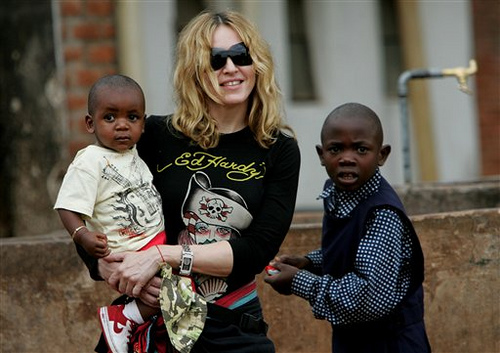
Madonna’s been all over the papers this week as she waits for Malawi to finalize legal proceedings for the adoption of her fourth child, a 14-month old girl named Mercy James. This comes on the heels of increased skepticism over the legality of her prior Malawi adoption: her son David Banda, age three, has a birth father who now claims he regrets the adoption. The rules for international adoption in Malawi are vague, but the 12-month mandatory waiting period (which Madonna appears to have bypassed) is not. Thus, because of her star treatment, Madonna’s adoptions have been treated with scorn rather than humanitarian envy. She’s even been called out by fellow adoption-happy celeb Angelina Jolie.
Though the recent flurry of celebrity adoptions has definitely brought attention to issues surrounding international adoptions, the results have been mixed. It’s hard to focus on the sinister undertones of taking a child out of a poverty-stricken country with high infant mortality rates. In the Republic of Malawi, for example, almost 12 percent of the population is infected with AIDS, medical care is minimal, and life expectancy hovers around a dismal 43 years.
But cynics argue that the benefits of international adoption, particularly when the adoptive parents are celebrities, rarely outweigh the costs. CNN wrote of Madonna’s first adoption of David Banda in 2006:
Regardless of the motives of their adoptive parents, a child picked up from a developing country and dropped straight into the inevitable media spotlight becomes an unwitting poster child for poverty…
Although Madonna has pledged $3 million to the Raising Malawi charity, which aims to provide care and support for the country’s one million (out of a total population of 12 million) orphans, even that generosity is tempered by the fact that the multi-million album-selling artist already has a fortune estimated to be worth some $460 million.
And, as Scott Carney reported in our March/April 2009 issue, vaguely worded international laws and cash-hungry adoption agencies make it very difficult to assure that a child in a poor country has been truly surrendered instead of trafficked. A little bit of extra research, Carney suggests, and adherence to international guidelines could save parents, biological and adoptive, a lifetime of regret.









